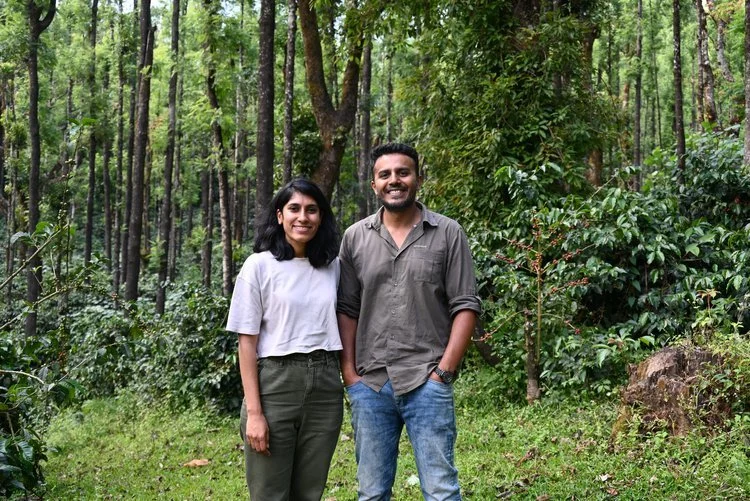personal coffee passport
Your coffee: Krishnagiri Estate
FARM: Krishnagiri Estate
LOCATION: Kandankolli Village Karnataka, Coorg, India
CULTIVARS: Chandragiri, Kents, S795, Geisha (still in its infancy)
FARM SIZE: 44 acres
ALTITUDE: 1,500 metres above sea level
EXPORTER: South India Coffee Company
IMPORTER: This Side Up Coffees
ROASTER: Special Roast
About Krishnagiri Estate
Located on the border to one of the oldest forests in the world, the Western Ghats Forests (where legend says Baba Budan arrived with his seven coffee beans) at Krishnagiri, coffee has been present for at least 150 years. Himu took on the corporate world for a while and soon decided to work on the estate a few years ago. He remembers his childhood amongst coffee; “there was no television, only wildlife and nature” he shares. “My father and grandfather didn’t know about specialty coffee per se, but they did know that when coffee was harvested at the very last of the season, it tasted the best. This one we usually kept at home back then.” For the past years, he’s been working closely with Komal and Akshay, upgrading their processing.
At Krishnagiri estate, coffee grows amongst jackfruit, mango, Chikoo, guava, mulberry, wild fig, black plum, gooseberry, coconut; jungle trees such as cinnamon, Ceylon rose wood, teak, sandalwood and with wildlife such as bengal tiger, Indian gaur, leopard, spotted deer, mouse deer, sambar deer, barking deer, ocelot, monitor lizards, giant Malabar squirrels, flying squirrels, vipers, cobra, rat snakes, wild boars.
Krishnagiri - coffee specs
what to taste for
Aroma: vanilla, stone fruit
Body: full mouthfeel, creamy
Acidity: stone fruits, passion fruit, melon
Aftertaste: slight hint of lemongrass
PROCESSING your coffee
Coffee cherries are handpicked, placed in colour sorter and soaked, where half yellows and green beans are further separated. Soon after, ripe cherries are sent to the drying patios and dried in natural sunlight for 15 to 20 days.
Himu and his wife have identified processing methods that bring out certain characteristics in the coffee. They’ve been able to standardise the methods in order to achieve the same cup profile year after year. Recently, the installation of a colour sorter helped them increase output and also maintain consistency in selection of the fruit.
ROASTING YOUR COFFEE
Special Roast uses a 22kg Probat UG22 roaster, that has been built in 1965. The roast time is 10 minutes. After the first crack, the coffee is roasted for a remainder of 25% of the time.
Relative PRICE BREAKDOWN
50%
Half of the green coffee price goes to the farmers of Krishnagiri. This price includes a +100% quality premium compared to the normal local robusta price.
18%
of the price goed to the exporter for the handling to get the coffee from the estate to Rotterdam.
13%
total shipping costs from Coorg, through customs and to our warehouse. We fill our containers with as much coffee as we can or hitchhike with other importers to keep these costs to a minimum.
14%
This Side Up compensation for spending time and resources bringing this relationship and coffee to life. Our work includes building relationships with origin partners in the field, finding markets for the coffees, linking farmers to rural banks and NGO partners, arranging the export and import channels, Q grading, sampling.
5%
Average financing cost we have to pay lenders - simply because we don’t have the money in the bank to buy such large amounts of coffee all at once. This ensures immediate payment to the farmers when the coffee leaves the farm or port.
Background of this coffee in the Netherlands
Indian coffee has been on our wish list for a very long time because of an incredible mix of properties we saw at some estates: advanced processing knowledge, a history of developing not only specialty arabica but robusta as well - combined with high ethics and business efficiency. You find yourself wondering how this country is not top of mind for more coffee roasters out there.
We admire our partners (from the South India Coffee Company) Komal and Akshay’s resolve to make coffee a viable way of living for themselves and the region. After their time in the UK, Komal and Akshay came back to Akshay’s family farm in India to restore it and seek alliances with a wide range of very diverse growers in the region. "We were not only looking for partners," says Komal "we were looking for passionate coffee growers that understand the complexities involved in this trade." With low prices and people leaving farms to work in cities, their proposition has to be based on higher prices and innovations: both technological as in terms of (regenerative) agriculture). Through hard work and a firm resolve they are proving that through coffee, a better future is possible for the people in their region and for the environment.
More than anything, Komal and Akshay work with like-minded individuals who actively fight global warming by implementing unique models that always put the soil and the ecosystem first. Their goal is to help their partners achieve consistent prices year on year, so they can invest back in the fields.








